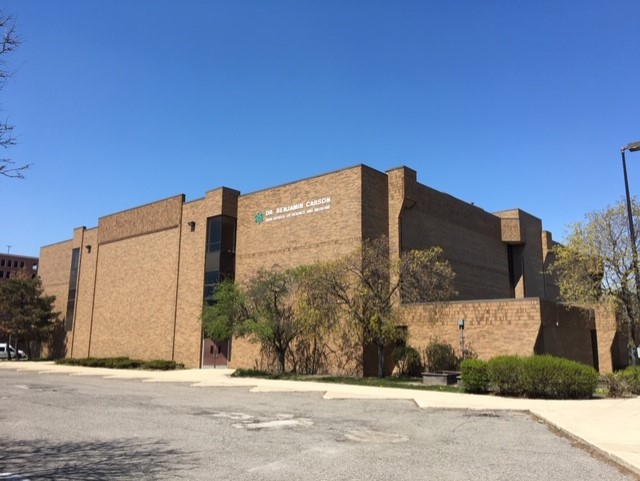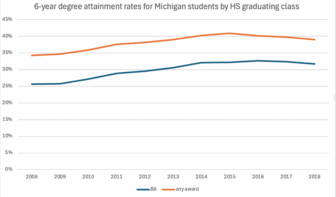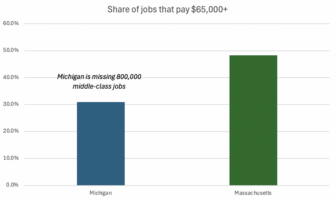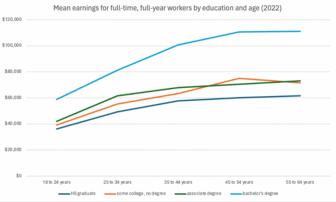We’re pleased today to share this post from Sean Henry, the College Transition Advisor at Benjamin Carson High School of Science and Medicine. Michigan Future helped to secure book scholarship funding for BCHS, thanks to the generous support of the Mandell L. and Madeleine H. Berman Foundation. We believe that book scholarships, which allow high schools to get detailed information from alumni about how they are faring in college, are one of the best ways to learn both how to better prepare kids for college, and how to support alumni in their persistence toward a college degree. This is vital learning. (You can also read our 2019 report on data from three high schools that administered a book scholarship program: What do alumni of Detroit high schools struggle with in college?)
Sean Henry is the College Transition Advisor and former teacher at Benjamin Carson High School of Science and Medicine, a Detroit Public Schools Community District high school in Midtown Detroit. His goal is to ensure every student has exposure to college experiences throughout high school and the tools they need to navigate the complex web of college admissions, financial aid, and scholarships once they reach senior year.
Educators everywhere arrive at school—whether it be physically or, in today’s day and age, virtually—on a day-to-day basis with one common goal: to prepare students for what comes afterwards. This is no different at Benjamin Carson High School of Science and Medicine here in Detroit, where we strive to inspire our students to hone the skills necessary for becoming tomorrow’s medical and science professionals, today. The problem, though, is that we are not always around for the day-to-day in the “afterwards” to track the extent to which that preparation is paying off.
With the help of Michigan Future Inc. and their partnership with the Mandell L. and Madeleine H. Berman Foundation, our BCHS alumni “book scholarship” program works to bridge the gap between the experiences our students have today and the paths they follow in their post-BCHS tomorrow. The “book scholarship” program has significantly improved our alumni tracking capabilities and, as a result, offered both a glimpse into how BCHS alumni fare in college as well as insight about what we can continue or start doing to ensure that future alumni are able to thrive even more in years to come. Several threads stand out in the data we have most recently collected via the “book scholarship” program, particularly from the qualitative survey students are asked to fill out in order to receive their funds.
For instance, our alumni appear to be actively engaged in their college-level coursework. Our students are actively asking questions or contributing to course discussions—in fact, nearly all (14/15) indicated that they did so “very often” or “often” in class. Although generating buy-in and participation in high school classes is a constant challenge everywhere, it appears that our students understand the importance—and, of course, take advantage—of taking ownership of one’s own success in college. After all, in a college setting, it is much less likely that professors and/or support staff will provide assistance if a student does not ask than is the case in high school. A majority of students also indicated that they “very often” or “often” asked another student to help you understand the course material; worked on class assignments, projects, or presentations with other students; and visited their instructor or TA during office hours (although there is more room for growth in this area above all of the others—only 11/15 came in at “very often” or “often” in this category).
Our students also appear to be acclimating relatively well to the collegiate social environment as well. Over one half (10/15) of students “very often” or “often” attended cultural or social events on campus; went to a lecture or panel discussion (not class-related); and, while the vast majority “never” played a team sport at any level, most (11/15) have at least made use of campus recreational facilities (pools, fitness equipment, courts, etc.) at least once. As such, it appears that the self-sufficiency students carried from BCHS into college academically has translated into the social sphere as well, and we all know how important well-roundedness is in today’s day and age.
On the other hand, “book scholarship” data also allows us to see where to concentrate our efforts at constantly improving our practice. For example, students seem to be having somewhat of a difficult time keeping up with the pace and/or rigor of college-level curriculum. Several students responded that they “sometimes,” “often,” or “very often” (2 “very often,” 2 “often,” and 6 “sometimes”) come to class without completing readings or assignments. Observing the students’ transcripts more closely, in fact, demonstrates that students have a particularly difficult time getting their footing early in their math courses once they get to college. While slipping behind in the first year is common for many college students, the fact that it is occurring this frequently is reflected by the occasionally erratic cumulative GPA data for our students in their first year in college. This could perhaps be related to the fact that some students believe that their high school curriculum was understandably not as rigorous or technologically-focused as their college-level courses, or because the shock of attending a college in general—from the social freedom that comes with it to, in some cases, unprecedented distance from family and friends—often causes students to lose focus, even when they maintained strong academic marks throughout high school. Either way, this information is invaluable in pinpointing exactly where we as educators should dedicate our energy—be it in the form of adjusting course pacing or course offerings or, say, increased focus on honing soft skills like time management—in that constant pursuit of our common goal: preparing our students for the world beyond BCHS.
In the end, data garnered from alumni tracking, from their successes to their struggles, grounds the work that we do everyday at BCHS in the words and reflections of those that matter most: our students. Beyond the wonderful feeling that comes with hearing how a now grown-up student is doing in the “real world,” the “book scholarship” program enables us to receive feedback on our work that can be all too difficult to elicit once our students graduate from BCHS. We look forward to putting this feedback to use and, especially as we navigate this ever more virtual educational landscape, adapting and adjusting our practice to meet the needs of our students, whatever they may be.







